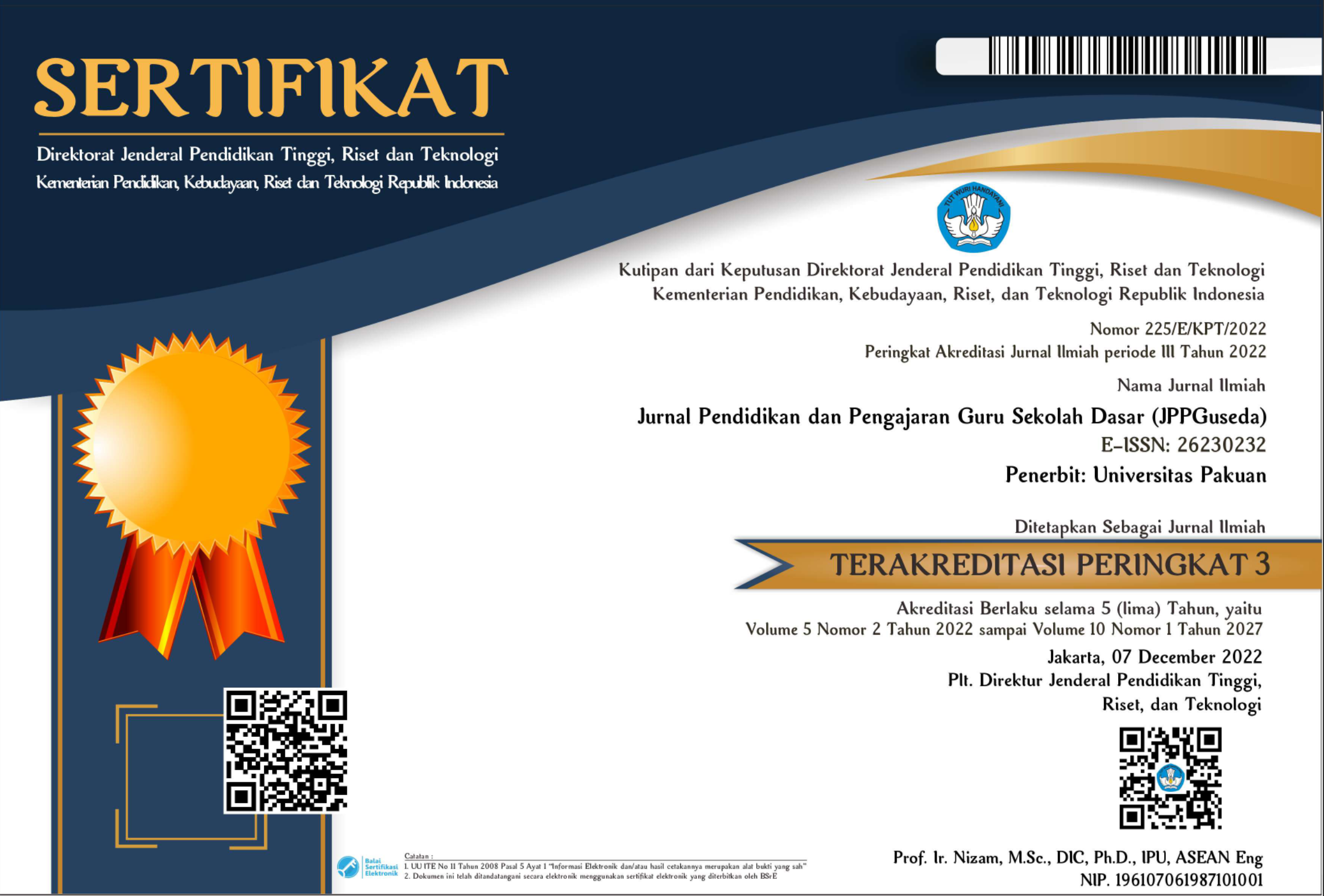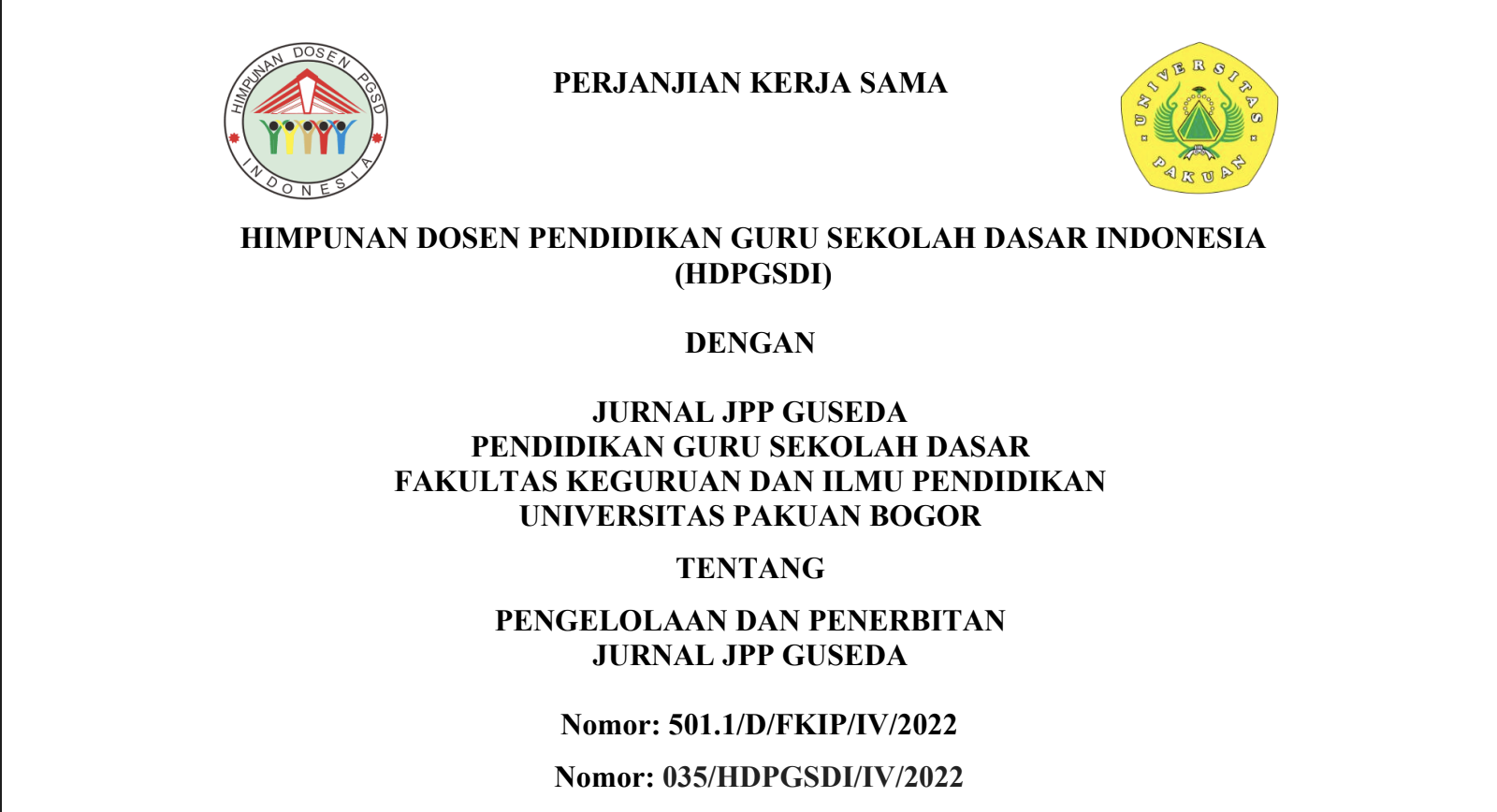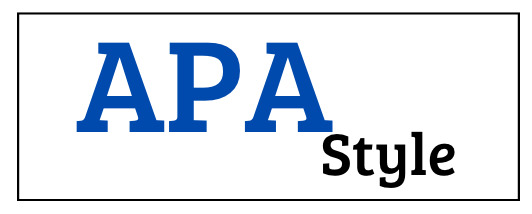Validity of the Development of Problem Solving Oriented Electronic Booklet Teaching Materials for Class V Students
Abstract
Keywords
References
Abdi Budiningsih, N. P. E., & Ardana, I. K. (2020). Pengaruh Model Pembelajaran Children’s Learning In Science Berbantuan Media Audio Visual Terhadap Kompetensi Pengetahuan IPA. Jurnal Ilmiah Pendidikan Profesi Guru, 3(1), 73–83. https://doi.org/10.23887/jippg.v3i1.26964
Arikunto, S. (2012). Prosedur Penelitian Suatu Pendekatan Praktik. Rineka Cipta.
Arviansyah, M. R., & Shagena, A. (2022). Efektivitas Dan Peran Dari Guru Dalam Kurikulum Merdeka Belajar. Lentera, 17(1), 40–50.
Asari, S. (2021). Paikem. Journal of Community Service, 3(2008), 1139–1148.
Fazio, X. (2023). Professional Learning Using a Blended-Learning Approach with Elementary Teachers Who Teach Science: An Exploration of Processes and Outcomes. In Contemporary Trends and Issues in Science Education (Vol. 53, pp. 107–127). https://doi.org/10.1007/978-3-031-23936-6_7
Fitriyah, A., & Ramadani, S. D. (2021). Pengaruh Pembelajaran Steam Berbasis Pjbl ( Project-Based Learning ) Terhadap Keterampilan. Journal Of Chemistry And Education (JCAE), X(1), 209–226.
Geletu, G. M. (2022). The effects of teachers’ professional and pedagogical competencies on implementing cooperative learning and enhancing students’ learning engagement and outcomes in science: Practices and changes. Cogent Education, 9(1). https://doi.org/10.1080/2331186X.2022.2153434
Ha, V. T. (2023). Teaching Science Using Argumentation-Supported 5E-STEM, 5E-STEM, and Conventional Didactic Methods: Differences in the Learning Outcomes of Middle School Students. Education Sciences, 13(3). https://doi.org/10.3390/educsci13030247
Hake, R. R. (1998). Interactive engagement v.s traditional methods: six- thousand student survey of mechanics test data for introductory physics courses. American Journal of Physics, 66(1).
Hastuti, P. W. (2022). Development of Science Student Worksheet Containing Local Potential of Geplak to Realize Problem-Solving Skill for Junior High School Students. In AIP Conference Proceedings (Vol. 2600). https://doi.org/10.1063/5.0115349
Herianto. (2022). Effect of interactive multimedia e-books on lower-secondary school students’ curiosity in a Science course. Education and Information Technologies, 27(7), 9619–9639. https://doi.org/10.1007/s10639-022-11005-8
Huang, Z. N. (2024). Analyzing Children’s Viewing Behaviors in Science Demonstrations with and Without Interactive E-Book Support. Journal of Science Education and Technology. https://doi.org/10.1007/s10956-024-10120-0
Jeavons, P. (2022). THE DESIGN OF EVOLUTIONARY ALGORITHMS: A COMPUTER SCIENCE PERSPECTIVE ON THE COMPATIBILITY OF EVOLUTION AND DESIGN: with Zachary Ardern, “The Contentious Compatibility of Evolution and Design: Introduction to the Book Symposium”; David H. Glass, “An Evaluation of the Biological Case for Design”; Meghan D. Page, “Thomist or Tumblrist: Comments on The Compatibility of Evolution and Design by E. V. R. Kojonen”; Peter Jeavons, “The Design of Evolutionary Algorithms: A Computer Science Perspective on the Compatibility of Evolution and Design”; Denis R. Alexander, “Evolution, Chance, Necessity, and Design”; Bethany N. Sollereder, “Response to The Compatibility of Evolution and Design”; Mats Wahlberg, “Divine Design and Evolutionary Evil”; and Erkki V. R. Kojonen, “Response: The Compatibility of Evolution and Design.” Zygon, 57(4), 1051–1068. https://doi.org/10.1111/zygo.12840
Kama, A. F. L. F. De. (2023). Production, distribution, and use of open access digital books in the social sciences and humanities field: A systematized literature review. Revista Digital de Biblioteconomia e Ciencia Da Informacao, 21. https://doi.org/10.20396/RDBCI.V21I00.8674715
Lin, C. Y. (2023). A Study on the Influence of Recreational Activities Intervening in Natural Science Courses on Learning Motivation and Learning Outcomes—The Case of Tabletop Games. Sustainability (Switzerland), 15(3). https://doi.org/10.3390/su15032509
Liyawindari, A. E., Sukartiningsih, W., & Suparti, S. (2023). Pengembangan Media E-Book Cerita Fiksi Untuk Meningkatkan Keterampilan Menulis Siswa Kelas VI Sekolah Dasar. Jurnal Teknologi Pendidikan : Jurnal Penelitian Dan Pengembangan Pembelajaran, 8(2), 500. https://doi.org/10.33394/jtp.v8i2.7714
Magdalena, R., & Tarigan, B. (2023). Pengaruh Model Pembelajaran Hands On Activity Terhadap Aktivitas Belajar Siswa Pada Mata Pelajaran IPA Kelas V SD Negeri 065015 Medan Tuntungan Tahun Ajaran 2022 / 2023. 2, 1–9.
Nida, S., Mustikasari, V. R., & Eilks, I. (2021). Indonesian Pre-Service Science Teachers’ Views on Socio-Scientific Issues-Based Science Learning. Eurasia Journal of Mathematics, Science and Technology Education, 17(1), 1–11. https://doi.org/10.29333/ejmste/9573
Novita, L., Talitha, S., Rohimah, R., Sundari, F. S., & Purnamasari, R. (2024). Independent Curriculum Management Through Developing Teaching Modules on Style Materials. AL-ISHLAH: Jurnal Pendidikan, 16(2), 1275-1288.
Nuragnia, B., Nadiroh, & Usman, H. (2021). Pembelajaran Steam Di Sekolah Dasar : Implementasi Dan Tantangan. Jurnal Pendidikan Dan Kebudayaan, 6(2), 187–197. https://doi.org/10.24832/jpnk.v6i2.2388
Nuriyah, D., Sutarto, & Prihatin, J. (2020). The development of environmental change textbook based on STEM-Cp to improve problem-solving skills in high school biology learning (Suratno (Ed.); Vol. 1563, Issue 1). Institute of Physics Publishing. https://doi.org/10.1088/1742-6596/1563/1/012054
Paulo, L. d. S. de. (2023). Book, document and intentionalities: a thematic visualization in Brazilian literature in Information Science journals. Revista Digital de Biblioteconomia e Ciencia Da Informacao, 21. https://doi.org/10.20396/rdbci.v21i00.8674821
Pramashela, A. D. (2023). The Implementation of Science, Technology, Engineering, Arts and Mathematics (STEAM) Based Design Thinkingln The Ethical Dilemma Story Project to Improve Student’s Creative Thinking and Learning Outcomes. In AIP Conference Proceedings (Vol. 2569). https://doi.org/10.1063/5.0112278
Pratiwi SN, Cari C, A. N. (2019). Pembelajaran IPA Abad 21 dengan Literasi Sains Siswa. J Mater Dan Pembelajaran Fis, 9(1), 34–42.
Rahmadani, D. F. (2023). Validity and Practicality of the Problem Based Learning E-Module Assisted by Augmented Reality on Virus to Improve Student Learning Outcomes, Retention, and Science Literacy. In AIP Conference Proceedings (Vol. 2569). https://doi.org/10.1063/12.0015280
Sari, I. P., Yuliantini, N., & Tarmizi, P. (2020). Pengaruh Penggunaan Media Scrapbook terhadap Hasil Belajar pada Pembelajaran Tematik Siswa Kelas IV SD Gugus X Kota Bengkulu. Jurnal Riset Pendidikan Dasar, 3(3), 1–8.
Saxena, P. (2023). Achieving Effective Learning Outcomes through the Use of Analogies in Teaching Computer Science †. Mathematics, 11(15). https://doi.org/10.3390/math11153340
Solehudin, D., Priatna, T., & Zaqiyah, Q. Y. (2022). Konsep Implementasi Kurikulum Prototype. Jurnal Basicedu, 6(4), 7486–7495. https://doi.org/10.31004/basicedu.v6i4.3510
Solihatin, E., Syarifain, R. I., & Siang, J. L. (2020). How to develop students’ character education, based on a social studies comic book. International Journal of Innovation, Creativity and Change, 10(12), 608–626. https://www.scopus.com/inward/record.uri?eid=2-s2.0-85079795020&partnerID=40&md5=e68c6f10356e5a251ae6d22d99cda313
Sopin, S., & Sanrattana, W. (2023). Teachers with Participatory Action to Enhance 21st Century Learner Skills. World Journal of Education, 13(3), 79. https://doi.org/10.5430/wje.v13n3p79
Sudarto, S., Asriadi, A., & Andi Muhammad Yudha. (2023). Analisis Kecerdasan Sosial Siswa Dalam Pembelajaran Ipa. JOEL: Journal of Educational and Language Research, 2(12), 1325–1336. https://doi.org/10.53625/joel.v2i12.6256
Sujarwo. (2022). Android-Based Interactive Media to Raise Student Learning Outcomes in Social Science. International Journal of Interactive Mobile Technologies, 16(7), 4–21. https://doi.org/10.3991/ijim.v16i07.25739
Sukmawati, Salmia, S. (2023). Population, Sample (Quantitative) and Selection of Participants/Key Informants (Qualitative). Edumaspul - Jurnal Pendidikan, Vol. 7 – N(6), 131–140. https://doi.org/https://doi.org/10.33487/edumaspul.v7i1.5259
Susanto, T. T. D. (2022). E-Book with Problem Based Learning to Improve Student Critical Thinking in Science Learning at Elementary School. International Journal of Interactive Mobile Technologies, 16(20), 4–17. https://doi.org/10.3991/ijim.v16i20.32951
Zhang, J. (2024). Application of flipped classroom teaching method based on ADDIE concept in clinical teaching for neurology residents. BMC Medical Education, 24(1). https://doi.org/10.1186/s12909-024-05343-z
DOI: 10.55215/jppguseda.v7i3.10211
 Abstract views : 162
Abstract views : 162
Refbacks
- There are currently no refbacks.
Copyright (c) 2024 Surga Nikmawati

This work is licensed under a Creative Commons Attribution-NonCommercial-ShareAlike 4.0 International License.




















